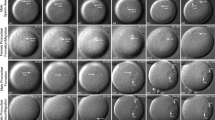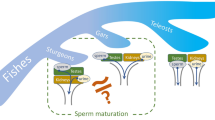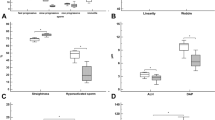Abstract
IN the course of investigations on the process of fertilization, immature rats, which had been allowed to mate, were killed shortly after induced ovulation. Thirty-six animals yielded 477 eggs in the early phase of fertilization. The correlation in the stages shown by the male and female elements in the living eggs was carefully examined with the aid of the phase-contrast microscope. The stages were classified as follows: for the male element, (a) sperm present in the perivitelline space, (b) sperm in the vitellus but with head unchanged, (c) sperm head changing, (d) male pronucleus forming; for the female element, (a) chromosomes in metaphase of second maturation division, (b) in anaphase, (c) in telophase, (d) polar body abstricted, (e) female pronucleus forming. The numbers of eggs showing these stages are recorded in the accompanying table.
This is a preview of subscription content, access via your institution
Access options
Subscribe to this journal
Receive 51 print issues and online access
$199.00 per year
only $3.90 per issue
Buy this article
- Purchase on Springer Link
- Instant access to full article PDF
Prices may be subject to local taxes which are calculated during checkout
Similar content being viewed by others
Author information
Authors and Affiliations
Rights and permissions
About this article
Cite this article
AUSTIN, C. Activation and the Correlation between Male and Female Elements in Fertilization. Nature 168, 558–559 (1951). https://doi.org/10.1038/168558c0
Issue Date:
DOI: https://doi.org/10.1038/168558c0
Comments
By submitting a comment you agree to abide by our Terms and Community Guidelines. If you find something abusive or that does not comply with our terms or guidelines please flag it as inappropriate.



